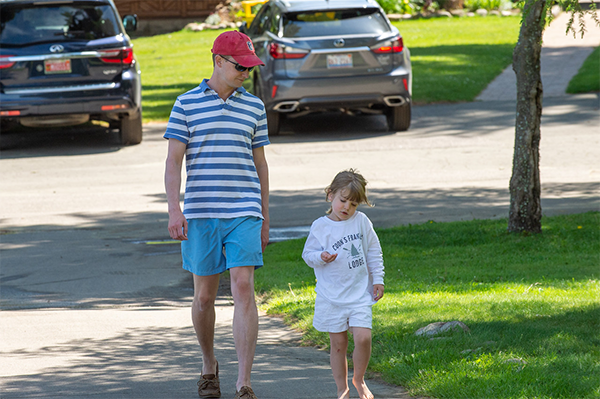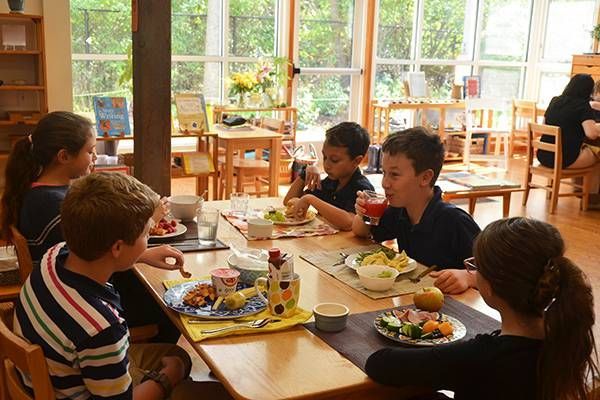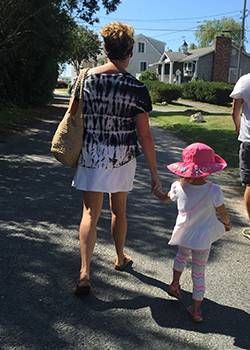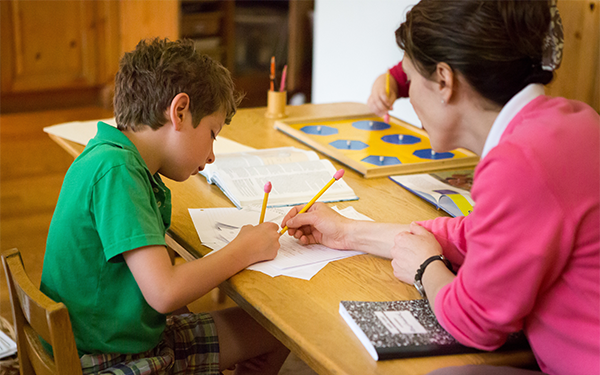
Getting Away With It...Again
“Jerry, it’s time to get out of the pool. Time to go now, please.” A father stands at the edge of a hotel pool in summer, clearly exhausted, as his wife walks past him carrying a crying baby girl, a floaty, a diaper bag, and two huge towels. “NO!” The boy in the pool, who looks to be about six years old, screams and makes an exaggerated pout, then disappears under the water before his father can say anything more.
I feel terribly sorry for this father, and I swim away, relieved that I don’t have to be in his shoes. Raising children is relentlessly humbling work. Then a second thought comes to me: I can’t help but feel concerned for the little boy getting away with this kind of noncompliant behavior. From his confident air, I am guessing that this is a pattern in their family. In recent years, I’ve noticed that some children, of all ages, seem to be making decisions for their parents and directing their parents.
Are children more rude than in the past? More difficult? I don’t think so. But I do think that many of today’s parents hesitate to take charge.
Building Pro-Social Behavior
The worrisome aspect of allowing children to run the show, in the long run, is that those children who practice pushing their parents around become increasingly unsure of their place in the world. They develop habits that do not ingratiate them to others.
The very first cues children receive about social interactions, what is fair and respectful behavior, are those from their parents. These experiences from home set the stage for children’s interactions out in the world with others. Most often, young children who are habitually defiant are searching for boundaries that they desperately crave. The adults in their lives need to provide leadership. They can do so without hesitating or apologizing, but by being loving, fair, and confident.
Parents must express confidence when they set the limit and say “No.” They can be sure that by removing a noncompliant child from a situation, they are giving necessary support. The goal at such times is much more far-reaching than the immediate situation at hand. Dr. Montessori wrote, “An individual is disciplined when he is the master of himself and when…he becomes accustomed to a discipline which is not limited to school but extends out into society.” Being able to master ourselves, with the self-control for cooperating with others, is something that adults help children to do over time, from their earliest years onward.
What should the guidelines for behavior be? Montessori said, “A child’s liberty should have as its limit the interest of the group to which he belongs.” If the behavior is causing disruption to others—including to you as a parent—then address it promptly. Your aim is to teach your child how to become an integral part of a positive community.

Being in a community is important for emotional well-being; desiring it is ingrained in us because it is how we survive and thrive. In other words, if a behavior is repelling others or causing an obstacle for someone else, it is nonsocial behavior. Such behavior may also lead your child to be unsure of why this behavior may leave them feeling unhappy and lonely.
Why Is It So Important?
If a parent cannot get a child to listen or to do what he or she has asked, they must consider that a teacher in a classroom, a caregiver on a playground, or a camp counselor in a day camp will not be able to, either. I am going to repeat this because it is so important to realize: If parents cannot get their child to listen to them or to do what they have asked, then nor can any teacher, caregiver, or camp counselor be expected to succeed.
Parents are the first leaders in a child’s life, offering a trusting relationship of complying with authority for the good of everyone in a group. This is pro-social behavior. Cooperative behavior must be established in a child’s first years of life, in preparation for school and for enjoyable group activities and community life. Consistency amongst the adults gives children security, so that they can put their energies into learning new things, instead of into pushing the limits.

In Public
The father at the pool’s edge didn’t have much chance to establish authority in the moment that day. I can’t blame him for not jumping into the pool, tackling his child, and dragging him away in front of an audience. But he does have the choice to address the noncompliant behavior by setting up their next outing to go differently. Parents can establish respect before getting into situations where children can run away or blow off a simple request.
If adults recognize certain situations where they won’t be able to follow through if they need to, the best decision is to aim for more controlled situations first, where you can establish the expected compliant behavior and work up to situations with more freedom and less immediate control.
This father might tell his child, not unkindly, “I will not take you to a pool when you don’t politely get out of the water when asked to. I need to see that you can be cooperative and respectful every time, not just sometimes.’” Children need this communication from their parents, the people who love them most. This is perfectly fair. Love your children enough to insist on behavior that will open doors for them in life, not close doors in their faces.
At Home
At home, parents may not always notice when their children are pushing the limits or being defiant. Especially when adults are distracted or tired, many children will see what they can get away with. It is important to take a step back, observe, listen, and watch for how your children respond when you ask them to do something that is a reasonable, socially acceptable norm.
Keep your expectations simple. Instead of having a list of rules, a family may consider just having two: be polite/kind, and don’t deliberately cause problems for other people. Almost anything you can think of falls under these two headings, making long lists of expectations unnecessary.
To be more specific, though, here are things to prioritize with children ages 15 months to four years old:
-We stay seated at the table when eating. No standing or walking with food.
-We wash our hands after using the bathroom and before handling food.
-We respond when summoned.
Children learn the grace and courtesy of their communities most between the ages of three and six, when they are in a sensitive period for absorbing customs. This means that children imitate the behaviors they see in day care centers, playgrounds, schools or camps. Consider this when choosing an environment for your young children and their adult mentors. The more consistency they experience, the better.
When children reach age 6, they typically conform to what they know is best behavior, but when they are younger, they accept and imitate a wider range of behaviors. This means that parents must be more vigilant in choosing environments for their younger children, realizing that the influences will be strong. Exposing your young child to bad behaviors is like telling them to do those things. It is that simple. This is why we urge parents to supervise their children when they are very young, to uphold the consistent standards of our Young Children’s Community and Primary classrooms, and to avoid other environments if discourteous behaviors are tolerated or go unnoticed.
How do you know when to draw the line as an adult on what is acceptable behavior? One guideline is when it’s best for you. In other words, take good care of yourself as a person, and you’re probably asking things of your child that are perfectly fair. You’re teaching them to treat you the way they should treat anyone they care about in society.
Be Confident!
Children are unsure when their parents are unsure. It is better to “fake it until you make it” than to second-guess your every move in front of your young children. We must always remember that children are developing human beings. They are not fully formed, and they do not have the judgment or experience that adults have. Just because they want something or don’t want something, doesn’t mean that that’s the best decision! They are young human beings, trying to find their ways.
Dr. Montessori taught us that we can have deep reverence for the process of human development and support it by observing, learning as we go, and providing sound leadership. And don’t take your child’s behavior personally; it’s perfectly natural for children to push the limits so that they can find out what the expectations are. The less you let their searching bother you, the more effective your responses will be. Take it in stride.
Lovingly give your children the limits they need. Be the leader. Your children will become happy people who know how to get along with everyone!


